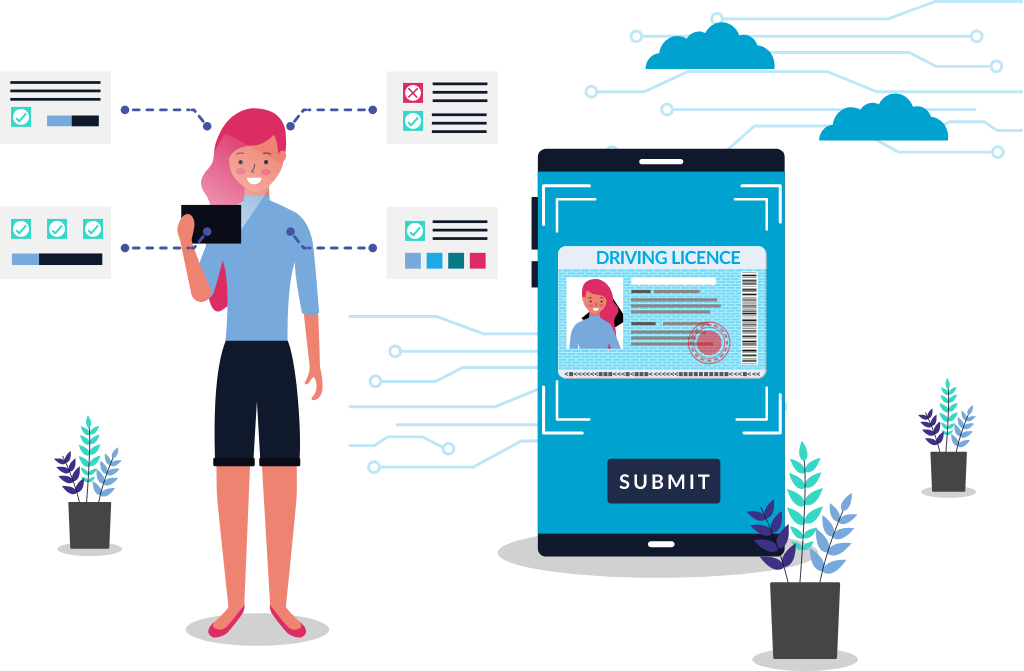Smarter identity checks to satisfy ‘Know Your Customer’ (KYC) requirements

Let’s say you work in a ‘B2C’ finance environment, such as a Pawnbroker, and a smart young man walks into your premises, wanting to do business with you. You’ve never met him before but he’s presentable, professional and seems like a nice chap. Don’t be fooled! It’s critical to satisfy yourself that he is who he says he is with a Know your Customer check (KYC). Do you have a simple way to do that? And how can you reduce the risk of doing business with a fraudster?
As you probably know, anti-money laundering (AML) regulations state that your first step should be to perform an appropriate level of identity check to satisfy ‘Know Your Customer’ (KYC) requirements. This most often starts by the person being asked to produce some form of official documentation to prove their identity.
Imagine the prospective customer shows two forms of identity as requested – a French passport and a French identity card. The photos on the documents look like the man in front of you. So far so good. You may even take copies of his ID documents at the photocopier or scanner as part of the process that fulfils your compliance obligations. But what about checking the validity of the document itself? Would you know what to check on either French document to see if it’s genuine?

The truth is that unless you have had very specific training in how to spot a fake ID, you’re unlikely to know what to look for in a French document to make sure it’s real. What’s more, as our world gets ever-smaller, with easier intercontinental travel and mass migration, your customers are likely to present identity documents from a wider range of countries than just the EU member states or the UK.
Training your staff to make ID checks can be costly and time consuming and needs to be repeated regularly to keep up to date with the latest ID document features. What’s more, genuinely issued identity documents have a multitude of different security features which can’t be effectively validated by eye. And with several thousand different issues of world identity documents in existence at any one time – ID cards, passports, visas, driving licences and more – it’s very difficult to conduct manual checking with any degree of confidence, even with advanced training.
The manufacture and distribution of false identity documents has also been facilitated by increased use of the internet and advances in printing technology. So, whilst your manual checks may be thorough, they are often no match for modern forgeries which can be produced on a mass scale.
A cautionary tale
TrustID identity document validation solutions assist numerous businesses in their compliance activity, ranging from casinos to Local Authorities. A customer in the finance sector, one of the UK’s largest secured loan distributors, recently introduced electronic ID verification and as a result, thwarted an attempt by a fraudster to obtain a loan using a fake driving licence. The loan application for £40,000 passed all the ‘standard’ checks, probably including an element of visual ID check and copy process mentioned above. But the ID scanning technology flagged up the fake driving licence at the centre of the application and enabled the lender to stop the application from going through.
Electronic validation solutions
Electronic verification systems capture, process and verify critical data from printed information and hidden security features, returning an accurate analysis of an identity document’s authenticity. The TrustID solutions also produce a PDF report which is available to export and store in your existing IT systems. This report includes a copy of the document concerned, the checks performed against it and a record of who carried out the scan and when. This means staff spend less time making a visual assessment, photocopying or scanning documents and you have a record of checks for compliance audit purposes.
Fraudulent documents
The increased adoption of ID checking technology can protect a wide range of businesses as well as helping in the fight against growing ID fraud. The team at TrustID includes former UK Border Force and military staff working alongside technology specialists: this expertise has helped us to build information sharing protocols with the police and a close working relationship with the Home Office and Immigration service. Whilst we advise our customers to return any fake document to the person presenting it to avoid putting staff at any unnecessary risk, our links with these organisations mean that the fake document report can be forwarded to the police for further investigation, going some way to ‘stun’ the future use of that document.
What’s more, to further tighten your KYC and AML compliance and protect your business, information from a fraudulent identity document report may help when reporting any suspicious activity. Fake documents are produced on an industrial scale and as such counterfeiters will use the same document numbers over again; information from forgeries can be useful intelligence to law enforcement investigating and trying to prevent the production of fake documents.
ID scanning technology could play a valuable role in your risk-based approach to compliance, checking visible and hidden security features and reducing the training burden by empowering and reassuring those staff members making ID checks. What’s more, an electronic check can streamline your operational process and act as a deterrent to any fraudsters who may be tempted to try and do business with you. After all, getting it wrong could prove costly…
Want to find out more?
Our document validation services could help you with compliance by making quick, consistent KYC / AML checks. Why not get in touch to find out how we could help your KYC checks?
Sign up to receive updates
Receive notifications from TrustID direct to your inbox. Simply fill out your email address in the form below.
Want to find out more?
We’d be really happy to chat through your requirements and offer advice on the best service for your business.
Tel: 0118 466 0822 or email us.
Request a callback


